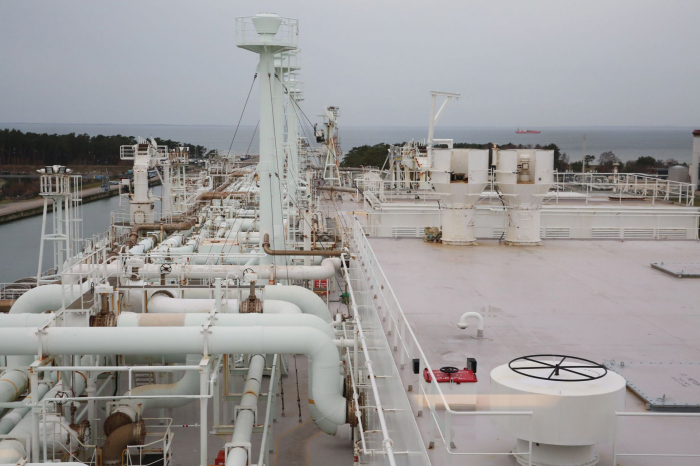The EU will hit Russia with unprecedented sanctions against its lucrative gas sector, according to the Belgian EU presidency — a once-unthinkable step that could drain hundreds of millions from Moscow’s war chest.
The decision, which EU ambassadors reached Thursday morning, came after stiff opposition from Germany and Hungary stalled a deal for weeks — though over different parts of the package.
The penalties won’t hit the majority of Russia’s liquid natural gas (LNG) exports to the EU. Instead, they will ban EU ports from reselling Russian LNG after it arrives and block financing for Russia’s planned Arctic and Baltic LNG terminals.
It’s a notable moment for the EU. Since Vladimir Putin’s full-scale invasion of Ukraine in February 2022, the bloc has left Russian gas unsanctioned — even as it slapped strict bans on oil and coal exports. But with evidence mounting that Western efforts to drain Moscow’s fossil fuel revenues are falling woefully short, pressure has been building to go after gas.
It wasn’t easy.
For weeks, Hungary threatened to veto the package on principle, as it opposes most additional Russian energy sanctions. That was expected.
Berlin’s opposition, however, came as a surprise. Their concerns were not even about gas but, as Chancellor Olaf Scholz explained, related to new obligations for EU exporters.
Given that Germany has previously chided Hungary for its sanctions stubbornness, the irony wasn’t lost on some diplomats.
“Ultimately, all member states try to protect their interests,” said one diplomat from an EU country, who like others was granted anonymity to speak candidly. “Reality is biting [Germany] hard now. Call it karma.”
In the end, negotiators relented to Germany’s concerns, dropping a clause it feared would harm small businesses, pending a study of the potential effects, three EU diplomats said.
Hungary, for its part, backed the LNG bans after it got reassurances that the Russia-backed expansion of its Paks II nuclear plant won’t be sanctioned, according to three other diplomats
While the LNG sanctions got through, negotiators are still wrangling over another proposal to mirror Russian penalties onto Belarus, a backdoor for sanctioned goods to reach Russia. The issue was slated for discussion on Thursday afternoon, according to two EU diplomats. Germany and France have been holding up those plans over fears they will impact sales of luxury goods.
Gunning for gas
Since Moscow’s full-scale invasion of Ukraine, the EU has slashed its reliance on Moscow’s gas by around two-thirds.
But it has continued to import and resell Russian LNG, which is shipped by tanker in supercooled liquid form — representing a major embarrassment for the bloc as it attempts to starve the Kremlin’s war chest. Spain, France and Belgium bought up the largest volumes last year.
Although Russian LNG made up just 5 percent of the EU’s gas consumption in 2023, it still raised around €8 billion in LNG profits for the Kremlin. The deal will likely only hit around a quarter of that, as it doesn’t ban direct imports to the bloc.
Still, the sanctions will force Moscow to overhaul its LNG business model — particularly for supplies it sends to Asia through Europe. Russia will now likely have to reroute those shipments via the Arctic Sea, requiring specially equipped icebreakers that are in short supply.
For Germany, however, the disagreement wasn’t even about fuel.
Berlin was worried that the sanctions would broaden a measure forcing EU companies to ensure customers are not selling goods on to Russia.
Currently, that so-called no-Russia clause only applies to firearms, battlefield items and dual-use goods with both a military and civilian application. Germany feared that expanding the clause to cover more civilian products, like chemicals and machinery for metalworking, would hammer small businesses.
The difficulty, Berlin said, is that smuggled products often make many stops before reaching Russia, making it near-impossible for smaller companies to track the entire chain. Germany argued that smaller, export-oriented companies will simply give up on some business in Asia or the Middle East that isn’t even connected to Russia, fearful about potential sanctions violations.
“It’s all about the German economy,” one of the diplomats said. “They are very worried.”
The concerns have created yet another rift in Scholz’s three-party, center-left coalition: Germany’s foreign ministry, led by the Greens, has long wanted to push the sanctions through, while Scholz’s Social Democrats wanted to hold out until the no-Russia clause issue was resolved.
Last week, an official from Annalena Baerbock’s foreign ministry, granted anonymity to speak candidly, said they feared Germany’s delays were hurting Berlin’s attempts to shed its pre-war reputation for pushing Russia-friendly economic policies.
Politico
More about:














-1741278702.jpg&h=190&w=280&zc=1&q=100)

































